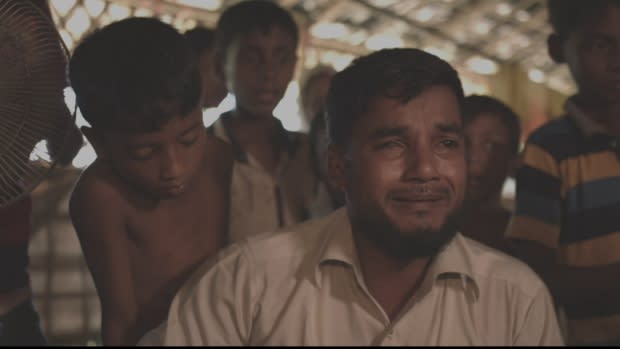Rohingya refugee thanks Canada 'from the bottom of our hearts' after genocide motion
A Rohingya refugee living in an overcrowded camp in Bangladesh is heaping "heartfelt thanks" on Canada for declaring the Myanmar military's actions against his people a genocide.
The emotional show of gratitude by 28-year-old Mohammed Islam was captured by a film crew working in the camp and shared with CBC.
Islam was responding to last week's motion, unanimously adopted by MPs from all parties, that formally condemns the atrocities against the Muslim minority population as crimes against humanity.
"We have nobody to hear, to solve our problems. Finally the Canadian government declared that my government has committed genocide against the Rohingya people," he said.
"Thanks, from the bottom of our hearts."
The Rohingya man, who works as a teacher in the camp he has lived in since 1992, was speaking to a Poland-based film crew, which shared the video with CBC after contacting the Prime Minister's Office.
In addition to his expression of "heartfelt thanks" to Canada and the U.K., Islam conveyed another message: "Please don't abandon us."
John Lyotier is a Canadian working with the film crew, which is putting together a video about how technology can help refugees. He said he was surprised the news of Canada's genocide declaration had made its way into a refugee camp — a place he'd expected to be an informational "black hole."
Islam's unprompted reaction, he said, made him recognize the significant impact that the House of Commons motion had on refugees feeling isolated and forgotten by the rest of the world.
"They are paying attention to what the world's doing, and sometimes all it takes is someone standing up for what is right, and that makes them feel not so alone," Lyotier said in an interview from Bangladesh. "What I think that gave them was hope, and hope is a very precious commodity."

Marek Osiecimski is the Polish director of the video crew, which is due out next spring. He said Islam's plea for the world to remember the Rohingya was a profound moment for him.
"I think it's a great example for the rest of the world. It's a great example for my country, which is still reluctant to do what we should, I think, on helping refugees in Europe," he said. "I really felt proud of Canadians to hear that their Parliament decided to recognize that what happened with the Rohingya people was a genocide."
All parties support motion
The House of Commons motion passed Thursday officially endorses the findings of a UN fact finding mission that concluded that crimes against humanity have been committed against the Rohingya Muslims and other ethnic minorities.
The motion calls for sanctions against the highest levels of the Myanmar military's chain of command for perpetrating "horrific acts."
It also calls on the UN Security Council to refer the situation to the International Criminal Court, so that the senior officials can be investigated and prosecuted for genocide.
After the motion passed, Foreign Affairs Minister Chrystia Freeland praised the "cross-party action."
"It's a very important step for Canada to recognize that the crimes against the Rohingya constitute a genocide," she said from Washington, where she was taking part in NAFTA talks. "Canada has been at the forefront of both pursuing justice for the Rohingya and working to provide support for the Rohingya forced out of their homes."
The Conservatives issued a release stating the motion came only in response to pressure from the Conservatives.

"Unfortunately, when it comes to foreign policy, the Trudeau government is always playing catch up. It is unfortunate that they continuously fail to do the right thing, as in the case of the resettlement of Yazidis, until they are pressured by the opposition and the Canadian public," the statement read.
Conservative MPs held a news conference the day before the motion to pressure the government on several fronts, including the Rohingya genocide issue.
In May, the Liberals pledged $300 million over three years to address the Rohingya refugee crisis. The following month, Canada imposed sanctions on several Myanmar officials believed to be involved in brutal military attacks.
More than 700,000 Rohingya have fled violence in the past year, with most living in squalid, cramped camps in neighbouring Bangladesh.
Bob Rae, the prime minister's special envoy on Myanmar, is attending meetings on the crisis at the UN General Assembly in New York this week, and will be travelling to the region in about a month's time.
U.S. stops short of declaring genocide
The U.S. State Department released a report Monday based on a survey in spring 2018 of the firsthand experiences of 1,024 Rohingya refugees.
It concludes the recent violence in northern Rakhine State was "extreme, large scale, widespread, and seemingly geared toward both terrorizing the population and driving out the Rohingya residents."
The report stops short of calling the atrocities a genocide.
"The scope and scale of the military's operations indicate they were well-planned and coordinated," it says. "In some areas, perpetrators used tactics that resulted in mass casualties, for example, locking people in houses to burn them, fencing off entire villages before shooting into the crowd, or sinking boats full of hundreds of fleeing Rohingya."
Nikki Haley, U.S. ambassador to the UN, announced Monday another $240 million in humanitarian assistance for displaced Rohingya, bringing the total U.S. pledged funding to $504 million.

